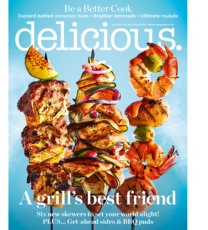What’s eating you?
It’s impossible to open a newspaper these days without discovering something new that’s bad for us. But you can take most food scares with a pinch of salt, says Will Dunn.
Imagine you’ve just sat down to a marvellous chicken dish – a Caesar salad, or maybe a slow-cooked coq au vin. It’s very tasty – and, incidentally, the chicken comes from Thailand. From a factory where a case of bird flu has been reported. Chances are, you’ll drop your fork.
But according to a report from the
(FSA), our perceptions about food risks could do with revising. The study shows that most food scares prove to be a storm in a teacup, and we return to these foods within a short time, having found that they’re not as deadly as we thought.
Luckily, there are some trustworthy organisations to advise us on what, if anything, is worth worrying about. The FSA has two excellent websites:
, which includes Andrew Wadge’s informative blog,and
, which provides advice on healthy eating.
, is an organisation dedicated to promoting clarity of information about a range of subjects.
When it comes to food scares, a dose of scepticism is always healthy – take these scare stories, and the reality behind them, for example:
MOZZA-HELL-A!
Headline: ‘Mozzarella meltdown: cheese deemed unsafe.’
Story In March, a report of high dioxin levels in Italy’s favourite cheese sent sales falling with countries restricting imports.
The facts The FSA’s Chief Scientist, Andrew Wadge, explains: “At the moment, we’re not aware that any of the affected mozzarella is for sale over here. The FSA and the food industry have very good systems in place for identifying problems.”
DEATH BY CHICKEN!
Headline: ‘Bird flu worse than SARS.’
Story In 2004, the EU declared chicken from Thailand unsafe; the UK consumes 50,000 tonnes of Thai chicken per year.
The facts Avian flu has never been known to pass to humans who have eaten infected chicken. It is picked up from live birds’ saliva, faeces or feathers. And infected meat is rendered safe by cooking.
BABY POISON!
Headline: ‘Arsenic in your baby’s food.’
The story Researchers reported arsenic in baby foods sold in UK supermarkets.The facts The Government published two surveys (October 2006 and May 2007), which state that levels of heavy metals, including arsenic, are below accepted limits in baby food.
Reports of the presence of this famous poison in baby food were hugely exaggerated and based on results which were subject to interpretation.
SOY SHOCKER!
Headline: ‘Shock ban on Chinese food.’
Story In 2001, one newspaper declared all Chinese food to be dangerous after it was found that a few of the UK’s more than 100 brands of soy sauce contained 3-MCPD, a potentially carcinogenic chemical.
The facts 3-MCPD can also be found in bread, bacon, crisps and more, but soy sauce is the only food in which it is regulated. Massive amounts would have to be consumed to pose any risk.
KILLER SALMON!
Headline: ‘Scottish farmed salmon is full of cancer toxins.’
Story Four years ago, farmed salmon was found to contain dioxins. The facts The levels of dioxins were well within the limits set by the WHO and the EU. The guidelines in the article were set by an American organisation.
Their limits are more cautious than modern medicine suggests is necessary – in fact, by their guidelines, breast milk contains ‘dangerous’ levels of dioxins.
Subscribe to our magazine
Food stories, skills and tested recipes, straight to your door... Enjoy 5 issues for just £5 with our special introductory offer.
Subscribe
Unleash your inner chef
Looking for inspiration? Receive the latest recipes with our newsletter